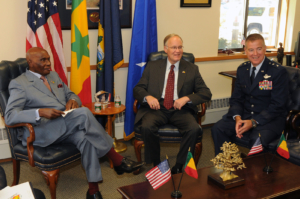6 Facts About Democracy in West Africa

Since it enacted democratic reforms more than two decades ago, West Africa has made substantial progress in democracy and human development. However, recent armed conflicts, corruption scandals and constitutional rights suppressions have caused recent setbacks in democracy in West Africa. One can see this in the form of undemocratic constitution modifications used to retain power, coups in several West African nations, social media restrictions and insurgencies. Although the region is much more stable than before its democratization, those in power must correct recent violence and corruption in West African nations to ensure that democracy in West Africa is viable long term.
6 Facts About Democracy in West Africa
- Coups. Burkina Faso has faced three coups in two years, with the latest one coming in January 2022. Mali and Guinea also experienced similar coups, which were led by mid-ranking military officials. On top of these government coups, many West African nations such as Nigeria have dealt with terrorist attacks from Boko Haram.
- Elections. Mali’s military junta went back on its previous promise with the Economic Community of West African States (ECOWAS) to hold elections in 2022, instead opting to push the date back to 2026. As a result of the junta undemocratically holding on to power by delaying elections, ECOWAS placed harsh economic sanctions on Mali. Also, Togo’s 2020 election was marked by calls of fraud by the opposition party that lost to its incumbent leader Faure Gnassingbé, who took control in 2005 after his father and former coup leader Gnassingbé Eyadéma died.
- Freedom House’s 2019 Democracy Index. Five of the 12 nations with the largest score declines in Freedom House’s 2019 democracy index are West African countries. After Freedom house reclassified Senegal and Benin as “partly free,” the only West African nations that Freedom House designated as “free” are Ghana and Cabo Verde.
- Effects of Extremism on Poverty. Many nations in West Africa are still developing economically while simultaneously dealing with issues of terrorism and anti-democratic sentiment. According to the World Bank, almost 60% of rural Togolese live below the poverty line. The growth of violent extremism in West Africa is a byproduct of economic hardship and limited access to education, which leads to an increase in crime.
- The Role of the International Community. External election monitoring and assistance can help not only bring back faith in West African electoral systems but also provide a smooth transition of power. A new sense of legitimacy in these elections will make coups, and political violence in general, less common. When government leaders such as Mali’s junta opt to push elections back as a way to stay in power, strict economic sanctioning from the EU and ECOWAS are vital to incentivize democracy and dissuade leaders of other nations from following in Mali’s footsteps.
- Initiatives Underway. Tariffs and other economic sanctions can dissuade nations from getting rid of democratic norms. In 2017, Mali, Burkina Faso, Niger, Chad and Mauritania created a task force called G5 Sahel Joint Force to address extremism in West Africa. However, the long-term success of West African democracy also relies on grassroots support of organizations that aim to combat violent extremism and educate citizens on civic values. USAID created the REWARD II project, building on the first phase of the REWARD project that ended in 2020, to address security vulnerabilities by locating West African regions at risk of political violence and teaching peaceful approaches to conflict management within the community.
Looking Ahead
Although democracy in West Africa has been on an upward trajectory since the early 2000s, the recent spike in coups, political extremism and terrorism have caused setbacks to the democratic progress that West African nations previously oversaw. Through economic sanctioning of undemocratic actors on the global scale and grassroots peacemaking strategies, nations outside of West Africa have also demonstrated an interest in the region’s development.
– Salvatore Brancato
Photo: Wikipedia Commons
